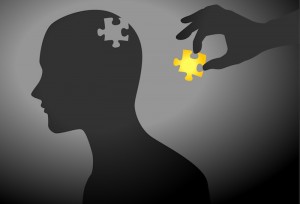Mental disorders affect millions of people in the world and can lead to years of psychotherapy. In some cases, the psychological problem suffered is extremely rare or bizarre. This is a list of the five most bizarre psychological disorders.
Also known as Amputee Identity Disorder, this illness causes a person to wish to have a healthy part of their body amputated. In some cases, the sufferer has gone so far as to amputate their own limbs. Some sufferers also have sexual fetishes involving amputees. Some surgeons have actually amputated a limb for a person suffering this disorder but it is a highly controversial move and most doctors use similar treatments to those used for phantom limb disorders. Hence, it is one of the most bizarre psychological disorders.
Even though the root cause and the underlying mechanisms of what leads to this mental disorder are unknown, scientists believe that some factors contributing to it could be related to obsessive-compulsive habits, childhood and sexual trauma and sexual fantasies.

Prosopagnosia, or “face blindness.” This disorder is characterized by an inability to recognize faces visually even with normal vision. People with prosopagnosia may be able to recognize their friends through sounds, smells, or touch.
Dr. M.G. Kartheeka, MBBS, MD
Erotomania refers to people who are deluded into thinking that someone else is in love with them but what makes this disorder especially bizarre is that the person who is supposedly in love with the sufferer is usually someone of much higher status than themselves-and often a celebrity.
This delusion can be difficult to break; even if the supposed lover directly denies any feelings of love, it is often not enough to convince the deluded individual. Unfortunately, there isn’t much known about this particular disorder, especially in regard to its treatment.
Diogenes syndrome is another bizarre phycological disorder especially seen in the elderly where a person does not take care of themselves or their surroundings, leading to poor hygiene and possibly some health and social challenges
Dr. Ashish Bajaj, M.B.B.S., M.D.
Schizophrenia and bipolar disorder are two mental disorders that are highly linked with erotomania. Feelings of low self-esteem, fear of rejection and loneliness, social distancing and refusal to believe anyone else’s point of view apart from your own are some common attributes observed in people with this disorder. People with low self-esteem are at a higher risk of developing this disorder since they may misread social situations and weave a story in their heads that makes them feel better. Losing a loved one or someone you were attached to can also cause this disorder as the patient may falsely associate themselves with a person of a much higher status to seek a sense of security.
Folie à deux (from the French for ”a madness shared by two”) is a rare psychiatric syndrome in which a symptom of psychosis is transmitted from one person to another. The same syndrome shared by more than two people may be called folie à trois, folie à quatre, folie en famille (family madness) or even folie à plusieurs (”madness of many”).

This disorder usually happens with people living in close proximity to one another- such as husbands and wives.
Even though the precise causes of this disorder are unknown the two major factors contributing to the development of this disorder are
Research states that when people are socially isolated from the world but are living in the same space together, they tend to depend on each other, picking up each other’s habits and getting influenced by one another. When these people are isolated together, they don’t have an outsider to point out their delusions and correct them. Thus, they go on believing that their delusions are true. It is important to separate these people when treating them from the inducer who influenced them.
Derealization is an alteration in the perception or experience of the external world so that it seems strange or unreal. Other symptoms include feeling as though one’s environment is lacking in spontaneity, emotional colouring and depth. Individuals who suffer from derealization may complain that what they see lacks vividness and emotional colouring. Emotional response to visual recognition of loved ones may be significantly reduced. Feelings of déjà vu are common. Familiar places may look alien, bizarre and surreal. The world as perceived by the individual may feel like it is going through a dolly zoom effect. Such perceptual abnormalities may also extend to the senses of hearing, taste and smell.
Derealization is often caused by events that have occurred at a young age like – emotional trauma, abuse and neglect. When a child faces trauma such as these in their formative years, they tend to resort to detachment from their immediate environment to cope with the hurt. Other causes include:
Mythomania is a condition involving compulsive lying by a person with no obvious motivation. The affected person might believe their lies to be the truth and may have to create elaborate myths to reconcile them with other facts. A ”pathological liar” is someone who often embellishes his or her stories in a way that he or she believes will impress people. It may be that a pathological liar is different from a normal liar in that a pathological liar believes the lie he or she is telling to be true, at least in public and is ”playing” the role.
As with any other mental disorder, it is important to seek counseling if you suspect you or someone you know is suffering. Taboos and stigmas are obstacles one must ignore to achieve mental well-being and treating some of the most bizarre psychological disorders.
Research conducted to get to the underlying issues causing pathological lying hasn’t yielded any accurate reasoning yet. However, this disorder is said to be a symptom observed in several other personality disorders like narcissistic disorder, antisocial personality type and histrionic personality to name a few.
Disclaimer: The information provided here is for educational/awareness purposes only and is not intended to be a substitute for medical treatment by a healthcare professional and should not be relied upon to diagnose or treat any medical condition. The reader should consult a registered medical practitioner to determine the appropriateness of the information and before consuming any medication. PharmEasy does not provide any guarantee or warranty (express or implied) regarding the accuracy, adequacy, completeness, legality, reliability or usefulness of the information; and disclaims any liability arising thereof.
Links and product recommendations in the information provided here are advertisements of third-party products available on the website. PharmEasy does not make any representation on the accuracy or suitability of such products/services. Advertisements do not influence the editorial decisions or content. The information in this blog is subject to change without notice. The authors and administrators reserve the right to modify, add, or remove content without notification. It is your responsibility to review this disclaimer regularly for any changes.
Bipolar disorder is a chronic mental illness wherein the mood of the individual suffering from it shifts from one extreme to another. Formerly known as manic depression, the National Commission on Macroeconomic and Health report states that more than 6% of the Indian population is suffering from a severe mental disorder such as schizophrenia or bipolar disorder. It is important for us to know about the major types of bipolar disorder.
It is highly important to understand the seriousness of such a disorder as many individuals who are suffering from this usually exhibit risky behavior and may even feel suicidal. Here are few signs to watch out for!
There are several types of Bipolar Disorders. While dealing with a patient, you need to understand that Bipolar Disorder is a complex illness. The signs might vary from person to person depending on the type of Bipolar Disorder he/she is suffering from. The Types of Bipolar Disorder range from mild to severe and they are as follows-
Individuals suffering from this type of Bipolar Disorder experience a manic episode at least once in his/her lifetime. A manic episode is defined as a behaviour where the mood is abnormally elevated and the actions of the individual result in disrupting his/her life.
Similar to Bipolar I in terms of highs and lows. However, does not reach the full potential when they are at their high point. A person suffering from such type would experience different types of depression for 2 weeks straight and reach a happy high state for 4 days next but never experience the state of mania.
Roughly about 15% of the population in the world suffers from this condition. A person experiences episodes of mania & depression at least 4 times a year or more each year. The majority of the people who suffer from rapid cycling are women in their early 20s.
Those who suffer from this usually are the ones who are diagnosed with Bipolar at an early stage. Many patients suffering from the mixed Bipolar condition are usually first diagnosed as suffering from Bipolar I and then when the episodes start getting cyclical and it becomes a lifelong struggle.
Cyclomythic disorder is usually the mild one out of all the other types of Bipolar Disorder. A person suffering from this might experience mood swings ranging from depression and hypomania (elevated mood). What makes this particular disorder different from Bipolar 2 are the factors of irregularities and unpredictability! People suffering from this disorder have had successful careers but personal relationships often witness turmoil.
This basically refers to people who suffer from bipolar due to other conditions. Recurrent depression, impulsive disorders, eating disorders like anorexia & bulimia, personality disorders and conduct disorders are some signs that are attached to the Bipolar spectrum.
Also Read: Navigating Bipolar Disorder: How a Person With Bipolar Thinks
Disclaimer: The information provided here is for educational/awareness purposes only and is not intended to be a substitute for medical treatment by a healthcare professional and should not be relied upon to diagnose or treat any medical condition. The reader should consult a registered medical practitioner to determine the appropriateness of the information and before consuming any medication. PharmEasy does not provide any guarantee or warranty (express or implied) regarding the accuracy, adequacy, completeness, legality, reliability or usefulness of the information; and disclaims any liability arising thereof.
Links and product recommendations in the information provided here are advertisements of third-party products available on the website. PharmEasy does not make any representation on the accuracy or suitability of such products/services. Advertisements do not influence the editorial decisions or content. The information in this blog is subject to change without notice. The authors and administrators reserve the right to modify, add, or remove content without notification. It is your responsibility to review this disclaimer regularly for any changes.
 There is a dearth of evidence for this grand claim. Psychiatry, ably abetted by the drug industry, has created an idea of mental health that may bear little resemblance to reality. Here is a list of such widespread ignorance about mental health. Knowing them can help greatly in improving mental health.1. Mental Illness Is the Result of a Broken BrainMost psychiatrists believe that the main cause of the mental illness is a life-long brain defect. We are often told that people diagnosed with schizophrenia (a severe mental health problem involving hearing voices, jumbled thoughts, and unusual beliefs) display brain deformities.But recent research suggests that the antipsychotic drugs used to treat schizophrenia can cause human brain defects directly in proportion to the amount of medication ingested-the more of the drug consumed, the greater the extent of damage to the brain. Despite failing to find any strong association between brain shrinkage and the intensity of the schizophrenia, the researchers cling to the idea that antipsychotic medication only aggravates underlying brain defects. However, it has also been demonstrated that antipsychotic drugs given to macaque monkeys reduce their brain volumes by around 20 percent, casting further doubt on the broken brain dogma.Furthermore, childhood abuse (a major risk factor for schizophrenia and other disorders) is known to alter brain structure, suggesting that early trauma may contribute to structural changes in the brains of adults with mental health problems.2. Severe Mental Disorders Are Mainly Genetic In Origin
There is a dearth of evidence for this grand claim. Psychiatry, ably abetted by the drug industry, has created an idea of mental health that may bear little resemblance to reality. Here is a list of such widespread ignorance about mental health. Knowing them can help greatly in improving mental health.1. Mental Illness Is the Result of a Broken BrainMost psychiatrists believe that the main cause of the mental illness is a life-long brain defect. We are often told that people diagnosed with schizophrenia (a severe mental health problem involving hearing voices, jumbled thoughts, and unusual beliefs) display brain deformities.But recent research suggests that the antipsychotic drugs used to treat schizophrenia can cause human brain defects directly in proportion to the amount of medication ingested-the more of the drug consumed, the greater the extent of damage to the brain. Despite failing to find any strong association between brain shrinkage and the intensity of the schizophrenia, the researchers cling to the idea that antipsychotic medication only aggravates underlying brain defects. However, it has also been demonstrated that antipsychotic drugs given to macaque monkeys reduce their brain volumes by around 20 percent, casting further doubt on the broken brain dogma.Furthermore, childhood abuse (a major risk factor for schizophrenia and other disorders) is known to alter brain structure, suggesting that early trauma may contribute to structural changes in the brains of adults with mental health problems.2. Severe Mental Disorders Are Mainly Genetic In Origin Most psychiatrists also link the risk of schizophrenia to the genes we inherit from our parents. In support of this argument, they point to studies of identical twins (who share exactly the same genes), which seem to show that if one twin has schizophrenia there is a very high chance the other will too. Almost 70 years ago, one of the most famous twin researchers, Franz Kallman, announced an 86 percent concordance rate for schizophrenic twins-in other words, if one twin was diagnosed with schizophrenia there was an 86 percent chance their sibling would suffer from the same condition-suggesting a huge genetic influence.However, decades of research has signally failed to identify the genetic marker that supposedly underlies schizophrenia. Meanwhile, psychiatrists like Jay Joseph have sought to demonstrate that the twin and adoption studies touted as proof of a genetic cause are riddled with biases, ranging from blatant misreporting of the data to subtle statistical tricks. Reviews of the research that have excluded the effects of these flaws and focused only on more recent, better-designed studies, have estimated the schizophrenia concordance rate for identical twins and non-identical twins to be 22 percent and 5 percent respectively, indicative of a real but modest genetic contribution-on a par with the genetic contribution to traits such as intelligence.Also Read: Why Does My Jaw Pop? Research-Based Explanations and Solutions3. The Number of Mentally Ill People Is IncreasingPsychiatry constantly tells us about the vast number of ”mentally ill” people there are in the general population, most of them have never received professional help and many not even aware that they have a problem. Some are suffering from different types of depression while some are struggling really hard from the causes of fatigue.The central reason for this apparently ever-increasing number is that psychiatry keeps widening the net of mental illnesses to incorporate more and more normal reactions to life’s challenges. According to DSM-5, if you remain sad two weeks after the death of a loved one you are suffering from ”major depressive disorder.” A child displaying tantrums risks acquiring the label of ”disruptive mood deregulation disorder.” And a modest degree of forgetfulness in later years means you are suffering with ”mild neurocognitive disorder.” It is a wonder anyone manages to avoid the grasp of these ever-elongating psychiatric tentacles.4. Many People with Mental Health Problems Have No Potential to Recover
Most psychiatrists also link the risk of schizophrenia to the genes we inherit from our parents. In support of this argument, they point to studies of identical twins (who share exactly the same genes), which seem to show that if one twin has schizophrenia there is a very high chance the other will too. Almost 70 years ago, one of the most famous twin researchers, Franz Kallman, announced an 86 percent concordance rate for schizophrenic twins-in other words, if one twin was diagnosed with schizophrenia there was an 86 percent chance their sibling would suffer from the same condition-suggesting a huge genetic influence.However, decades of research has signally failed to identify the genetic marker that supposedly underlies schizophrenia. Meanwhile, psychiatrists like Jay Joseph have sought to demonstrate that the twin and adoption studies touted as proof of a genetic cause are riddled with biases, ranging from blatant misreporting of the data to subtle statistical tricks. Reviews of the research that have excluded the effects of these flaws and focused only on more recent, better-designed studies, have estimated the schizophrenia concordance rate for identical twins and non-identical twins to be 22 percent and 5 percent respectively, indicative of a real but modest genetic contribution-on a par with the genetic contribution to traits such as intelligence.Also Read: Why Does My Jaw Pop? Research-Based Explanations and Solutions3. The Number of Mentally Ill People Is IncreasingPsychiatry constantly tells us about the vast number of ”mentally ill” people there are in the general population, most of them have never received professional help and many not even aware that they have a problem. Some are suffering from different types of depression while some are struggling really hard from the causes of fatigue.The central reason for this apparently ever-increasing number is that psychiatry keeps widening the net of mental illnesses to incorporate more and more normal reactions to life’s challenges. According to DSM-5, if you remain sad two weeks after the death of a loved one you are suffering from ”major depressive disorder.” A child displaying tantrums risks acquiring the label of ”disruptive mood deregulation disorder.” And a modest degree of forgetfulness in later years means you are suffering with ”mild neurocognitive disorder.” It is a wonder anyone manages to avoid the grasp of these ever-elongating psychiatric tentacles.4. Many People with Mental Health Problems Have No Potential to Recover Recovery from mental health problems doesn’t necessarily equate with the elimination of all symptoms. A more meaningful definition for many sufferers might involve the pursuit of valued life goals, and the subsequent achievement of a worthwhile life, irrespective of difficulties. In this sense, to move towards recovery requires the transition from pathology, illness, and symptoms to a greater focus on health, strengths, and wellness. Free from the shackles (and self-fulfilling pessimism) of psychiatric dogma, meaningful recovery is a realistic goal for all.Also Read: Helping someone with depressionDisclaimer: The information provided here is for educational/awareness purposes only and is not intended to be a substitute for medical treatment by a healthcare professional and should not be relied upon to diagnose or treat any medical condition. The reader should consult a registered medical practitioner to determine the appropriateness of the information and before consuming any medication. PharmEasy does not provide any guarantee or warranty (express or implied) regarding the accuracy, adequacy, completeness, legality, reliability or usefulness of the information; and disclaims any liability arising thereof.Links and product recommendations in the information provided here are advertisements of third-party products available on the website. PharmEasy does not make any representation on the accuracy or suitability of such products/services. Advertisements do not influence the editorial decisions or content. The information in this blog is subject to change without notice. The authors and administrators reserve the right to modify, add, or remove content without notification. It is your responsibility to review this disclaimer regularly for any changes.
Recovery from mental health problems doesn’t necessarily equate with the elimination of all symptoms. A more meaningful definition for many sufferers might involve the pursuit of valued life goals, and the subsequent achievement of a worthwhile life, irrespective of difficulties. In this sense, to move towards recovery requires the transition from pathology, illness, and symptoms to a greater focus on health, strengths, and wellness. Free from the shackles (and self-fulfilling pessimism) of psychiatric dogma, meaningful recovery is a realistic goal for all.Also Read: Helping someone with depressionDisclaimer: The information provided here is for educational/awareness purposes only and is not intended to be a substitute for medical treatment by a healthcare professional and should not be relied upon to diagnose or treat any medical condition. The reader should consult a registered medical practitioner to determine the appropriateness of the information and before consuming any medication. PharmEasy does not provide any guarantee or warranty (express or implied) regarding the accuracy, adequacy, completeness, legality, reliability or usefulness of the information; and disclaims any liability arising thereof.Links and product recommendations in the information provided here are advertisements of third-party products available on the website. PharmEasy does not make any representation on the accuracy or suitability of such products/services. Advertisements do not influence the editorial decisions or content. The information in this blog is subject to change without notice. The authors and administrators reserve the right to modify, add, or remove content without notification. It is your responsibility to review this disclaimer regularly for any changes.